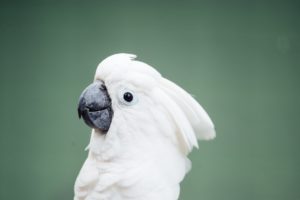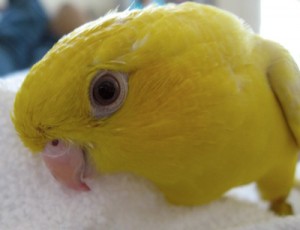
Photo by CHUTTERSNAP on Unsplash
A lot of well-deserved time is spent on the recognition and better understanding of bird intelligence, a process that we are seeing more of these days via in-depth studies. These are not living room observations from backyard birders, either. The uptick in scientific studies surrounding birds has risen incredibly as science begins to home in on not only many species of birds’ obvious intelligence factors, but also a closing gap between possible communication that could create avenues of understanding for us.
A recent study (What Does Polly Say?) undertaken by two ornithologists and a student (Dr. Lauryn Benedict, Alexandra Charles, Amirah Brockington, Dr. Christine R. Dahlin) takes a closer look at parrot vocal collections of words. And this time, they opt out of the more difficult-to-study wild parrots and, instead use companion parrots. They’ve asked parrot owners for data accumulating information involving almost 900 parrots (877, to be exact). Among those birds were white cockatoos, parakeets, African grey parrots, blue-and-gold macaws, and 15 other species. What was discovered was amazing. Although individual owners are already impressed with their birds’ skill sets, the scientists learned a few things.
It’s already known that parrots possess extreme learning abilities having the essential body and brain structures that support vocal learning. It was understood that parrots learn words and sounds quickly and early, although they continue to absorb newer sounds and words throughout their lifespans. It’s known that among the studied parrots, African grey parrots possessed the highest degree of vocal learning.
With this study, it was ideally recognized that companion birds are more exposed to human language. And so, inquiry via surveys to the owners helped to gain valuable data, yielding a precision that gave greater and quicker insight. The surveys were created and presented asking specific questions about their birds’ use of words, phrases, and sounds. The returned data represented the best-drawn data over any study of bird mimicry before it. Another important factor studied was how often the humans interacted with their birds along with those that interacted much less.
Young Learners, Creative Talkers
 It was learned that many of the birds acquired their vocabulary as young birds. Even more fascinating, it was learned that a percentage of the birds moved learned words around on their own to create new phrases. Another discovery was that birds used appropriate words and phrases in the correct context without human prompting at interesting points during the day. The gathered data suggests that neither male nor female birds were unequal in their learning capacities. Extreme care was paid to the male/female representation groups to avoid a generalization of assessments.
It was learned that many of the birds acquired their vocabulary as young birds. Even more fascinating, it was learned that a percentage of the birds moved learned words around on their own to create new phrases. Another discovery was that birds used appropriate words and phrases in the correct context without human prompting at interesting points during the day. The gathered data suggests that neither male nor female birds were unequal in their learning capacities. Extreme care was paid to the male/female representation groups to avoid a generalization of assessments.
Cumulative end results show that the age, social, and sex of birds were not the reasons for vocal learning. Rather better examples of mimicry existed with some species over others. This uniquely designed study provides a better ongoing understanding of how birds learn their language and the use of that learned language (and sounds) within socially interactive environments with humans and with other birds. This study will be used as basis data for future, more advanced studies on learning language and sound mimicry within a controlled space with birds
For a fuller understanding and a more accurate breakdown of this study, refer to the journal entry in Scientific Reports found at nature.com. The study is ongoing, and you can contribute your own data to the project. Simply respond to this link. It leads to a Google Doc survey that you can answer and send back.






I have to respectfully disagree. I’m 75 years old. I’ve had birds most of my life. As a child I had parakeets. Several females. They were playful and fun but never learned to talk. My mother got very young males and taught them to talk. We had three as I was growing up that were extremely excellent talkers. She even got three and taught them to talk for other people. She always insisted they be very young males. I’ve had Female Eclectus – excellent talker she went to the nursing home where my mother was a pt and entertained residents almost everyday. Today I have a Galah Cockatoo. She talks very little even though I’m home with her 99% of the time and have worked with her a lot she just doesn’t talk. I refuse to withhold food to get her to talk. She does say mmmmgood when she likes something. She’s almost 15 years old and I’ve been with her since my retirement in 2008.
I will be most interested in reading the full study on this research listed at the end of your article. As a bird parent most of my life – cockatiels and parakeets – and a bird advocate and rescuer, the intelligence and emotional capabilities of these animals is amazing, as is their endless variety in personalities. I personally never taught my birds to talk as I always loved their own sounds, songs and chatter; my parakeets were mostly interested in each other, but each of my cockatiels’ abilities to pick up whistles and songs was fascinating. Among my bird-lover friends birds, however, were MANY excellent talkers, including one parakeet that lived to 30 and had an incredible vocabulary!
Birds has their own innate personalities just like each one of us. Helping the birds to be more vocal, the environment and the person(s) being involved with are the major impacts. Training a bird to talk with food enticing techniques is not really generating the birds’ interests to talk but rather teaching them that’s necessary to fill their hunger. Some birds are natural talkers, and mimicking really well without training techniques. One thing I did notice is birds have their preferences over the persons they like to interact with. With that being said birds regardless their vocal abilities are still magic little creatures to have around the house.